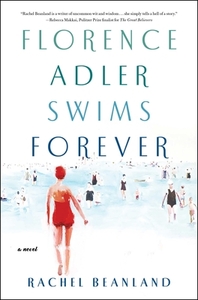Take a photo of a barcode or cover
This was a true character driven story. The author did a wonderful job of bringing these characters and their struggles onto the page. That this was loosely based on a real incident in her family’s life isn’t surprising as these characters linger in your mind like the stories your relatives tell. #teamgussie
This book was okay. I read it and I enjoyed reading it but it could have been so much better! It only slightly touches on some ideas that could have been explored more such as the Holocaust, what it was like to be Jewish in America at the time, being gay at 19 and not knowing how to tell your parents, embezzling money from your boss, etc. I wonder if the book would have been stronger if it was told from one perspective? I have a tendency not to like books told from so many perspectives. Also, WHY does Florence drown? I kept asking myself that and thought they would come back to that - or maybe some of the other characters would want to know? Did she commit suicide? Was she attacked by a shark? Was it heart failure as the epilogue states? I think my issue is more that no one in her family seems to care! And then the big tension with the sister and being pregnant - where was the payoff here? At the end she has the baby and everything is fine - but am I the only one wondering what the hell happens after that when they finally reveal her sister is dead and her husband is gone - paid off by her father?!? As I write this I’m beginning to like this book less and less and wow this is the longest review I ever wrote.
dark
sad
slow-paced
Plot or Character Driven:
Plot
Strong character development:
Yes
Loveable characters:
Complicated
Diverse cast of characters:
Yes
Flaws of characters a main focus:
Yes
emotional
hopeful
medium-paced
Plot or Character Driven:
Character
Strong character development:
Yes
Loveable characters:
Yes
Diverse cast of characters:
No
Flaws of characters a main focus:
No
Rachel Beanland draws on her family history in Florence Adler Swims Forever, a tender, character-driven debut novel.
On a sunny morning in the summer of 1934, as Esther and Joseph Adler stroll along the Atlantic City Boardwalk and their granddaughter Gussie, and houseguest Anna wade in the shallows, their daughter, Florence dons her bright red bathing cap and heads into the ocean. A champion swimmer, twenty-year-old Florence is training to swim the English Channel in just a few weeks, so no one expects that an hour later, her lifeless body will be dragged from the water.
Florence Adler Swims Forever unfolds from multiple perspectives exploring the decisions made, and the changes wrought, in the wake of Florence’s untimely death. Esther and Joseph are devastated by the loss of their youngest daughter, but Esther in particular is worried about how the news will affect their oldest, and makes the decision that she not be told. Fannie, Gussie’s mother, is in hospital on bed rest waiting the birth of her third child, her second having been born too prematurely to survive, and is growing increasingly annoyed that her sister hasn’t visited. Freed from the daily care of his wife and daughter, and taking advantage of his distracted in-laws, Fannie’s husband Isaac grows more distant, chasing a foolish dream. Seven year old Gussie, sweet and precocious, has an innocent’s clear-eyed view of the changes in her world, but is bewildered by its nuances. Anna, a young German Jewish woman whom Joseph has sponsored to study in America on the strength of a long ago association with her mother, is somewhat uncomfortable to find herself in the midst of this family tragedy, especially when her own threatens. Stuart Williams is the outlier- a Gentile, a handsome lifeguard, swim coach, and reluctant heir to a Boardwalk hotelier. He thought himself in love with Florence, and in the aftermath of her death strikes up a friendship with Anna.
The novel examines several themes, including those of grief, love and family, but most significantly, the sacrifices parents will make to protect their children. Esther forgoes some of the traditional rituals of mourning of the Jewish faith, and attempts to represses her own devastating sense of loss to safeguard the health of her remaining daughter, as does Joseph. Joseph also willingly compromises his financial resources to protect Fannie from her husband’s weakness. Fannie meanwhile spends three months confined to her hospital bed in the hope that the child she carries will be born healthy. Anna’s parents, concerned by the political climate in Germany as Hitler ascends to power, insist she travel to America, and pull whatever strings they can to see her safely out of the country. Issac, in complete contrast, selfishly abandons Gussie in pursuit of his own dreams, and betrays the support offered by his own father. Stuart’s relationship with his father is a little more nuanced, though the man definitely has his faults, he does care about his son’s future.
Beanland grounds her story well in time and place, with vivid descriptions of the beach and boardwalk of Atlantic City, and the Adler’s baking empire. Fannie is obsessed with the Dionne quintuplets born earlier that year and battling for survival, in part because her late son, Hyram, spent some time in an incubator on display at the Boardwalk, just as they did. The author also touches on the anti-semitism rife not just in Europe as the Nazi party began to gain a foothold, but also in America.
With a measured pace, Florence Adler Swims Forever is a meditative, poignant, and engaging read, suited to a languid summer afternoon.
I liked this book but it wasn’t what I thought it was going to be. I’m disappointed that we don’t get to see when Fannie discovers her sister is dead. I’m glad that Issac is gone but frustrated that he has no remorse for leaving his children and wife. I’m happy that Stuart and Anna ended up together and I hope it was enough to help her parent get to the US. Also even though I didn’t like Gussie in the beginning I’m glad that she ended up happy for Stuart and Anna. I’m sad she had to deal with Isaac as her dad. Interesting that this book is based on real life people even if the storyline isn’t real. I’m glad I read this book. It was good.
3 generations in Atlantic City during the 1930s. Death, love, secrets, marriage, anti-semitism, and more. I’m not really a historical fiction fan but this book hooked me from the beginning and kept my attention throughout.
I really enjoyed how this book is told from six character's POVs, and the setting made me feel like I was actually in summertime Atlantic City. I expected a story about a woman trying to swim the English Channel but instead I got a (sometimes boring) family saga. At the end, I found out this was a true story, which made me like it more, but I needed more from the ending.
I found this story to be riveting. I couldn’t put it down and when I had to put it down to sleep, exercise, and take care of my family, I couldn’t stop thinking about the characters. The author’s note at the end made the story even more fascinating.
I'd heard some good buzz about this one, so I decided to see what the fuss was about and...wow. This was really impressive!
It's the summer of 1934 in Atlantic City, NJ and a tragedy strikes a Jewish family. The rest of the book happens in the aftermath of this incident and we see how the news is kept from one of the daughters who is on bedrest for the final two months of her risky pregnancy. Meanwhile, a young German woman is staying with the family, trying to find a way to get her Jewish parents out of an increasingly hostile country. The book takes place over three months and we hear from seven characters - all either members of this family or directly adjacent to it - exactly three times - once for every month of the summer.
Not only is this book expertly organized (the order in which we hear from the seven characters is EXACTLY the same in all three sections - that's no easy feat), but the author took what would have been the climax in any other novel and put it in the very first chapter. It felt like a comedian starting their set with their best joke - you screw yourself over to see if you can rise to the challenge. Rachel Beanland really did that in this book. It is tender as it is sorrowful and the feeling of the beach is really there with you. Plus, the interesting link between all the characters in their feelings of being beholden to someone else made them all feel part of the same story even when they all were choosing radically different paths. The author took elements of her own family's story and morphed it into a beachy read with an ocean's worth of depth.
It's the summer of 1934 in Atlantic City, NJ and a tragedy strikes a Jewish family. The rest of the book happens in the aftermath of this incident and we see how the news is kept from one of the daughters who is on bedrest for the final two months of her risky pregnancy. Meanwhile, a young German woman is staying with the family, trying to find a way to get her Jewish parents out of an increasingly hostile country. The book takes place over three months and we hear from seven characters - all either members of this family or directly adjacent to it - exactly three times - once for every month of the summer.
Not only is this book expertly organized (the order in which we hear from the seven characters is EXACTLY the same in all three sections - that's no easy feat), but the author took what would have been the climax in any other novel and put it in the very first chapter. It felt like a comedian starting their set with their best joke - you screw yourself over to see if you can rise to the challenge. Rachel Beanland really did that in this book. It is tender as it is sorrowful and the feeling of the beach is really there with you. Plus, the interesting link between all the characters in their feelings of being beholden to someone else made them all feel part of the same story even when they all were choosing radically different paths. The author took elements of her own family's story and morphed it into a beachy read with an ocean's worth of depth.





